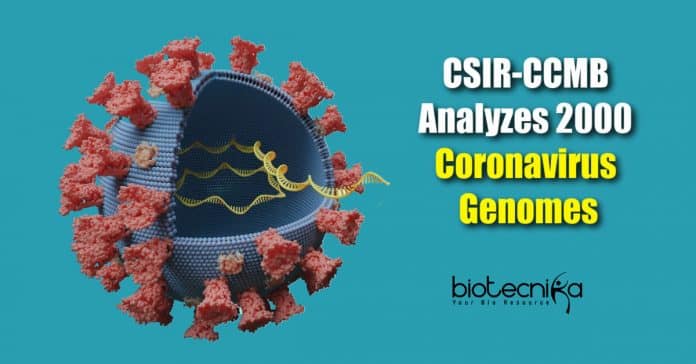2000 coronavirus genomes analyzed in India: The genomic landscape of SARS-CoV-2
More than 2000 coronavirus – SARS-CoV-2 genomes (an organism’s complete set of DNA) from India has been analyzed by scientists at the CSIR-Centre for Cellular and Molecular Biology (CCMB), Hyderabad, available in the public domain to understand about the different strains in circulation.
The presence of a distinct virus population among Indians was revealed in the month of June. This was recognized by the presence of four specific variations in their genomes and was named as the clade I/A3i. A clade is a group of organisms thought to comprise all the evolutionary descendants of a common ancestor.
During June, 41% of all Indian SARS-CoV-2 genomes belonged to this clade, and the present analysis shows that the ratio of the I/A3i clade decreased to 18%.
Dr. Divya Tej Sowpati, a Scientist at CCMB, leading this study, said that one of the four distinct variations that define the A3i clade is present in a critical viral enzyme called RDRP. RDRP is involved in making new copies of the viral RNA. They expect the A3i clade to slowly disappear with time as this variant was predicted to be bad for
the virus, and if the prediction is correct, this is exactly what they anticipate.The drop in the proportion of the A3i clade is followed by a raise of the A2a clade (in other nomenclatures, also referred to as the G clade or the 20A/B/C clades). The D614G mutation in their spike protein, which is shown to be associated with increased infectivity, is present in the viruses of the A2a or the G clade.
Currently, 70% of all Indians, as well as global SARS-CoV-2 genomes, comes under this category.
Dr. Rakesh K Mishra, Director, CCMB, and a co-author of the study, stated that as expected for a more infectious strain, the A2a clade quickly became the dominant clade in India just like in other places. There is no proof to claim that this mutation is clinically more complicated. As a vaccine or a drug targeting, this mutation will work with the same effect all over the world. The similarity in the viral SARS-CoV-2 genome around the world should be considered as positive news.
But it is noteworthy that presently no clade has been conclusively shown to be associated with a more severe form of COVID-19, or a higher risk of mortality.
2000 coronavirus genomes analyzed in India: The genomic landscape of SARS-CoV-2
Author: Sruthi S






























